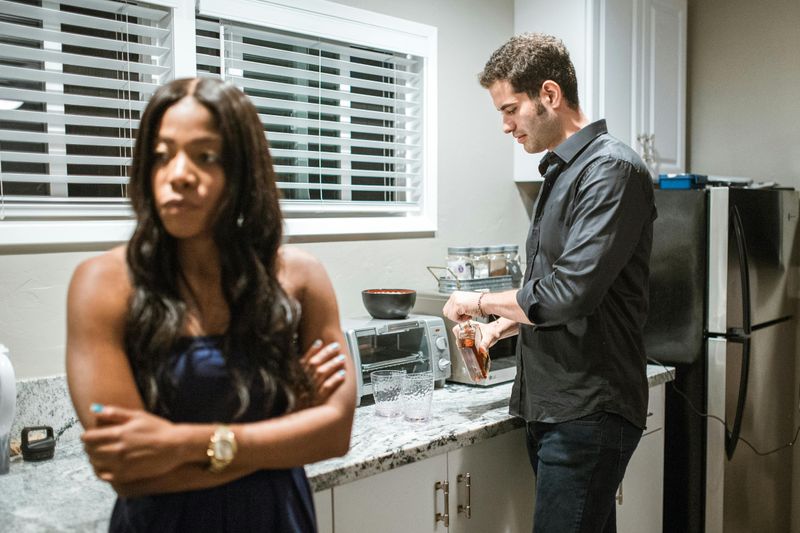9 Ways Self-Sabotage Can Show Up in Relationships

Self-sabotage in relationships happens when we unconsciously create problems that hurt our connections with others. We might do this because of past hurts, fear of getting too close, or not feeling worthy of love. Understanding these patterns can help us build healthier relationships and stop getting in our own way.
1. Fear of Vulnerability Keeps Walls Up

Being afraid to open up creates invisible barriers between partners. Many people build emotional walls as protection from potential hurt, preventing others from seeing their true selves.
This fear manifests in avoiding deep conversations, changing subjects when things get personal, or using humor to deflect serious moments.
Over time, these walls prevent the emotional intimacy needed for relationship growth. Partners often feel shut out and frustrated by this distance, not understanding it comes from a place of self-protection rather than rejection.
2. Expecting the Worst Before It Happens

Negative predictions become self-fulfilling prophecies in relationships. When someone constantly anticipates betrayal or abandonment, they interpret neutral actions as confirmation of their fears.
A partner working late becomes suspected cheating. A missed call transforms into deliberate avoidance. This mindset creates a constant state of relationship anxiety and suspicion.
The accused partner eventually feels mistrusted and exhausted from constantly proving their loyalty, creating the very relationship breakdown that was feared from the beginning.
3. Testing Your Partner’s Love with Challenges

When someone creates unnecessary tests in a relationship, it often stems from deep insecurity about their own worthiness of love. They might pick fights, withdraw emotionally, or set unfair expectations just to see if their partner will stay.
These tests often come from childhood experiences where love felt conditional or unreliable. The problem? Most partners don’t realize they’re being tested and simply experience confusing, hurtful behavior.
Each passed “test” only provides temporary relief before the need for another challenge arises, creating an exhausting cycle that eventually breaks down even the strongest relationships.
4. Finding Flaws to Justify Emotional Distance

Nitpicking every small flaw in a partner serves as protection against getting too close. The brain searches for reasons to create distance when intimacy feels threatening.
Small irritations become magnified: the way they laugh, how they load the dishwasher, or their taste in music. These “flaws” provide convenient excuses to pull away emotionally when vulnerability feels scary.
The focus on imperfections blinds people to their partner’s positive qualities and prevents them from experiencing the relationship’s full potential. Meanwhile, the criticized partner feels increasingly inadequate and unwanted.
5. Running Away When Things Get Good

Ironically, just as things begin to go well, some people sabotage the relationship. This often reflects a deeper fear of receiving the love and connection they’ve always wanted.
They might suddenly pick fights, reconnect with an ex, or create drama right after beautiful moments of connection.
This pattern often stems from not believing they deserve happiness or fearing they’ll eventually be disappointed. The timing feels mysterious to partners who wonder why problems emerge during otherwise happy periods. This cycle continues until the person recognizes their fear of success is driving their behavior.
6. Keeping Secrets That Create Distance

Unnecessary secrecy builds invisible walls between partners. This isn’t about privacy but about deliberately hiding parts of yourself that could foster connection.
Someone might conceal their true feelings, past experiences, financial situations, or daily struggles. The secret-keeper believes they’re protecting the relationship, but they’re actually preventing authentic connection.
The burden of maintaining secrets creates stress and emotional exhaustion. Partners sense something is being withheld even when they can’t identify what it is, creating an atmosphere of distrust that slowly erodes relationship foundations.
7. Comparing Your Relationship to Others

The habit of comparing to other couples sets a standard no one can sustain. Social media fuels this by showing perfect snapshots without the context of real effort and imperfections.
This habit focuses attention on what’s missing rather than what’s working. Real relationships with their messy moments and compromises always fall short against idealized versions.
Partners feel inadequate when they sense they’re being measured against an invisible standard. The irony is that the relationships being idealized likely have their own struggles that simply aren’t visible from the outside.
8. Refusing to Ask for What You Need

Expecting partners to read minds sets relationships up for disappointment. Some people believe that if they have to ask for what they need, it doesn’t count or isn’t genuine.
This creates a lose-lose situation: unmet needs lead to resentment, while partners feel frustrated by failing tests they didn’t know they were taking. The refusal to communicate directly often stems from childhood experiences where needs were dismissed.
The solution involves recognizing that clear communication is a strength, not a weakness. Healthy partners welcome knowing how to make each other happy rather than feeling burdened by having to guess.
9. Creating Chaos to Feel in Control

Some people unconsciously stir up relationship drama when things feel too calm. The familiar chaos feels more comfortable than unfamiliar peace.
This might look like picking fights before special occasions, creating jealousy scenarios, or manufacturing emergencies. For someone raised in unpredictable environments, stability can actually feel more threatening than turmoil.
Partners become emotionally exhausted from the constant ups and downs. Breaking this pattern requires recognizing that peace isn’t boring—it’s actually the foundation for deeper connection and growth that chaos prevents.

Comments
Loading…